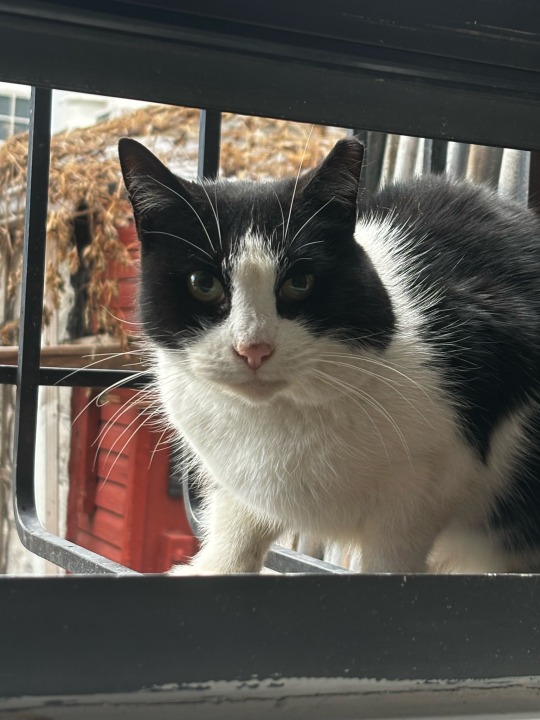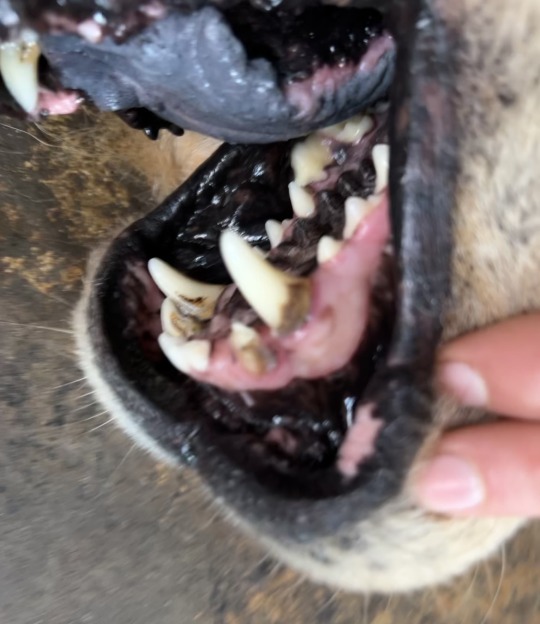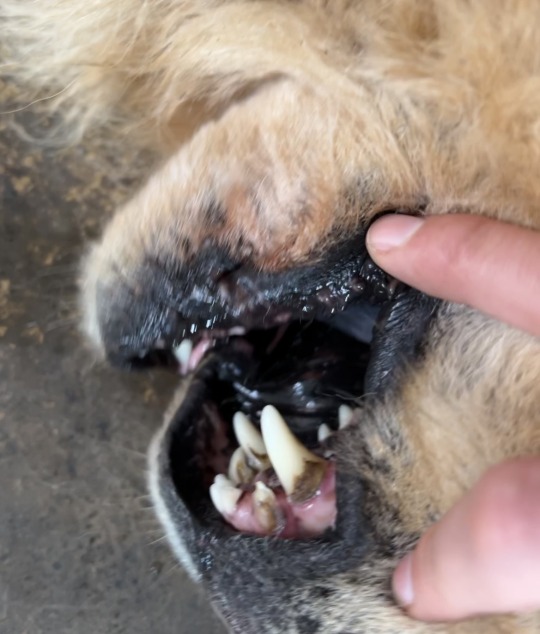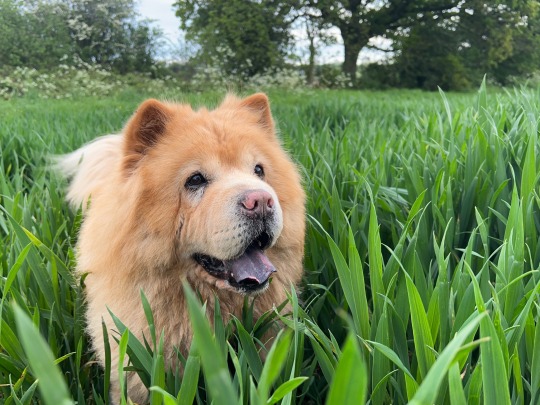#animal dental care
Explore tagged Tumblr posts
Text
In this informative video, we break down everything you need to know about animal health certificates. Learn about the importance of these certificates for travel, adoption, and veterinary care. We cover the necessary documentation, the process of obtaining a health certificate, and how to ensure your pet meets all the health requirements.
0 notes
Text
Step back into the 1950s with this vintage gem from the American Dental Association, from the Wellcome Collection available on JSTOR. This clip from a series of 1-minute TV announcements reminds us that maintaining a healthy smile is timeless. The animated PSA playfully suggests that if you take care of your teeth as you age, "you'll think you're another Peter Pan." 🦷 ✨ Explore how dental health advice was shared with audiences over 60 years ago and reflect on how much—or how little—has changed in our approach to oral hygiene in the full video on JSTOR.
#jstor#video#american dental association#wellcome collection#dental health#dental care#dental hygiene#teeth#animation#animated video#psa
207 notes
·
View notes
Text
Hey y’all! I never really post personal on here but I’m trying to fundraise for one of my outdoor feral cats I feed. She has an abscess and rotten teeth. Cat dental care is super expensive and on top of that I have to trap her myself too. Please share or donate if possible. Her name is Moo.
https://gofund.me/5f3fbcbb

60 notes
·
View notes
Text





This is a very hard post for me to make, my sweet prince momo has an infection that has already spread to his jaw bone. We are currently working with a specialist who is very respected and sought after in the exotic pets emergency field. We had the abscess in his mouth removed last night and his surgery is going to be the first week of January. I know the holiday season is a hard time for everyone but anything at all would greatly help.
43 notes
·
View notes
Text
Hey there! I'm reaching out because my sweet Zelda needs a vital dental procedure, and I could really use your support. Every donation, no matter how small, will make a big difference in her life, helping her get the care she needs and ensuring she stays by my side. If you could click the link below to donate or share it, I’d be so grateful!
https://gofund.me/179ea42b
#gofundme#pet emergency#veterinary care#queer disabled#disabled artist#pet help#esa#emotional support animal#complex ptsd#cat dental care#low income#pets#dental problems#dental procedures#gfm
32 notes
·
View notes
Text
I hate to have to make this post, but this sweet dog deserves my absolute best effort.
Juneau came to me with two broken canine teeth, it happened a while ago and I was told that her vet said they were okay. Over the last couple of weeks though, I've begun to suspect that she's in pain, so I made an appointment to have her teeth checked by a different vet just to be sure. Unfortunately, both canines are broken to the point of exposed roots and need to be extracted by a specialist. The vet said that she is in a lot of pain, and prescribed pain meds to help manage that until they can be extracted, but I could use some help coming up with the $1500 I was quoted by the specialist. I called several places and that was the lowest estimate I could get 😭 I don't know how long she's been in pain for, but I will do everything in my power to make sure that she gets the care she needs!! She's a great dog with a long life ahead of her, I love her and will do everything I can to make that a happy, healthy, pain free life 💙
Thank you so much to everybody who reads this!! I understand not everyone can donate, but it would mean the world to me and Juneau if you could share this post in that case so it can reach more people!
https://gofund.me/1d050021

#dogs#dogblr#donations#donate if you can#gofundme#vet bills#veterinary#dental care#animal rescue#dog rescue#rescue dog#rescued dog#dog dental care#dog dental health
22 notes
·
View notes
Text
#Jesus#God#Holy Ghost#dental care#vision care#At no cost#Everywhere#No cost everywhere#Hot and cold running water#heated and cooled shelter#News#World News#Food at no cost for everyone#vision and glasses and dental for animals#plants
7 notes
·
View notes
Text
Fwd:like jesus, God and the Holy ghost pointed out they should make glasses, vision, dental, and health care at no cost everywhere across earth to animals from every walk of life, plants, people, and any of God, Jesus, and the Holy Ghost's creations, and feed all at no cost, heated and cooled shelter at no cost, hot and cold clean running water for all at no cost. I personally love Jesus as king of kings and lord of lords through God his father, Messiah, Christ-annointed, and he is my savior hope he is yours as well. 2 kings chapter 5, John 9, Luke 8:46, Luke 9:1-6, Luke 9:13-17, Luke chapter 14:12-13, Luke 18:40-43, John 5:36-40, John 6:7-13, John 6:30-58, John 7:36-39, John 8:31-32, John chapter 10:24-42, John 11, John chapters 12 and 13, John chapter 24, John 15:17-27, John chapter 16, 17, 19, 20, and 21. Mark and Matthew the books and Luke 12.
Fwd:like jesus, God and the Holy ghost pointed out they should make glasses, vision, dental, and health care at no cost everywhere across earth to animals from every walk of life, plants, people, and any of God, Jesus, and the Holy Ghost's creations, and feed all at no cost, heated and cooled shelter at no cost, hot and cold clean running water for all at no cost. I personally love Jesus as king of kings and lord of lords through God his father, Messiah, Christ-annointed, and he is my savior hope he is yours as well. 2 kings chapter 5, John 9, Luke 8:46, Luke 9:1-6, Luke 9:13-17, Luke chapter 14:12-13, Luke 18:40-43, John 5:36-40, John 6:7-13, John 6:30-58, John 7:36-39, John 8:31-32, John chapter 10:24-42, John 11, John chapters 12 and 13, John chapter 24, John 15:17-27, John chapter 16, 17, 19, 20, and 21. Mark and Matthew the books and Luke 12.
#God#Jesus#animals#plants#healthcare#dental care#hot and cold running water#heated and cooled shelter#Vision#Vision care and glasses for animals#No cost#News#World News#Holy Ghost#Everywhere
10 notes
·
View notes
Text
Loki's home and has had his first doses of the medications. Got a chart made to keep track of future doses, should be able to do most of those myself but I've had to enlist my parents for the two times I'll be at work when he needs his meds. Should be able to manage this okay and hopefully he will start improving with these meds
All the vets were in agreement that Loki was the best-behaved hedgehog they've ever seen, they said that normally they have to put hedgehogs in water to convince them to uncurl enough to do an exam but Loki allowed them to examine him without too much protest, and that he cooperated really well with being syringe-fed when they gave him some of that nutrition supplement. He's a very popular boy!
One of the nurses also made the comment of "not everyone can handle exotics, but you can handle exotics. He's clearly really well-socialized and you've obviously done your research" which was really nice to hear especially with all the stress and anxiety about his health lately. Even when I do the best I can and even when it's something outside my control, I still worry that I'm making the wrong choices or am an unfit pet owner when things like this happen, so it was good to have that reassurance
#it's just weird bc like. all the pets i've had have lived long and healthy lives with few complications#my childhood dog lived to 17. the guinea pigs lived to be 6. loki's 5 now and this is the first health scare he's ever had#i always do my research and understand the animals as best i can and the numbers indicate i'm doing something right#but i still get this sort of imposter syndrome where i feel like i'm a bad pet owner when things don't go perfectly#even if it's not my control. hedgehogs are prone to dental issues and whs is genetic. it's not a reflection of poor care or anything#nothing i could have prevented from happening and all i could do was pay attention and seek treatment when things popped up
4 notes
·
View notes
Text




PLEASE SHARE!!!
#doglover#dogmeme#dogs#doggosdoingthings#dog teeth#dog dental care#dentist#vet bills#vet med#moodboard#supernatural fandom#fandom#fans#cottage vibes#anime style#cute animals#animals#helpful#ryan reynolds#rick and morty#ricky gervais#just checking#leisure#cozy vibes#aesthetic#stop asian hate#someone help#chowchow#chowchilla#dogblr
28 notes
·
View notes
Text
In this podcast, we explore everything you need to know about Animal Health Certificates—what they are, why they're important for pet travel, and how to ensure your pet meets all the necessary health requirements.
0 notes
Text
Okay, how about some dental stuff for some species?
Lenopan
Have no teeth, moving on
Erinaens
Possess 44 teeth as adults, but only 28 when they're tiny, which begin to grow in at about 6 months (Earth time) and are typically done by about a year old
Dental Formula: I 4/4 C 1/1 P 3/3 M 3/3
Babies/toddlers are missing their central pairs of incisors and two back-most sets of molars, as well as canines- the current theory is this helps prevent injury while nursing and slightly lowers choking risk by keeping food further forward in the mouth
They start losing their baby teeth at about 4, a little after the quills begin to grow in. Normally you can tell when a kitten is going to start losing teeth by checking for canine growth, these will grow in before the first baby teeth are lost
In regions where luat trees grow young twigs are harvested and stored in pots of saltwater sealed with resin, to be eaten over the rest of the year to clean the teeth and freshen the breath
In regions where the luat tree doesn't grow the most common method of tooth cleaning is the chewing of bundles of softened bark strips. The juices of various plants are mixed with salt water and it's in this the bundles are stored. A benefit this has over luat twigs in that the bark is inedible, and while it will wear down over time you still get more use out of a single bundle than you do a single twig
Another benefit is that normally at least one of the plants used will have antiseptic properties, helpful with any gum, tongue, or palate injuries
Necromancy is also helpful with this, and a necromancer good with bonework will probably also be able to handle any general dental problems
Still, you're never going to get perfection, doubly so when you lean heavily into frugivore, and especially in Erinaens that live a particularly long time you're likely to lose some teeth. Though it's rare for an Erinaen to lose all them
Dentures and replacement teeth among Erinaens are typically crystal (let them be, they have a lot of it) though wood and bone aren't unheard of
Perison
Possess 30 teeth as adults and 20 as small children, which begin growing in at about a year of age (Earth time) and are typically completely grown by 3 years
Dental Formula: I 1/2 C 0/0 P 3/3 M 3/3
Babies/toddlers are missing their second pair of incisors (present only on the bottom jaw) and back two pairs of molars
Baby teeth typically begin falling at at around 6 years and adult teeth are all in place by 12
Adults' second pairs of incisors grow forward and to the side. In ancient Perison ancestors these formed small, straight tusks used for display and combat, but in modern Perison they grow much more slowly and for most of one's life are noticeable only due to the pushing out of the near portions of the bottom lip to accommodate them. As one grows older, however, uneven wear compared to the rest of the teeth means that without dedicating wearing and grinding tusks become more prominent and can grow up to 2 inches long
All Perison teeth growth throughout their lives in a way similar to horses, to make up for constant wear due to their diet of primarily rough plant matter. These teeth are smaller and grow slower than they were in the past, before cooking became a common occurrence, but care must still be taken to ensure even and consistent wear
This is one of the reasons to chew bone- to encourage tooth wear when eating primarily comparably soft cooked foods
When properly maintained a Perison's teeth will reach the point of uselessness somewhere in their early 70s
For the most part dental hygiene looks like ours, though you won't find floss. Bristles came into play with the advent of plastic (previously you would scrub your teeth with a fabric pad on a handle) but plastics have long fallen out of favor on the planet and as a result one of the most common goods imported from other planets is stiff animal hairs that can be trimmed down into proper bristles- it's expensive, but still less so than setting up whole farms of animals they otherwise aren't going to be able to make use of
Still, the poorest herds and households have mostly gone back to the good old scrubbing pad
There's also a bit of a difference with mouthwashes, which are normally a combination of alcohol and salt which as you can guess isn't the most pleasant thing
Dentures and replacement teeth are normally made out of porcelain anymore, though quality varies. Acrylics and resins are, again, no longer popular. Metals are also sometimes seen, but most prefer for their dentures to look as similar to natural teeth as possible.
The exception is the tusks, which are more often done in metal and, when done in porcelain, are generally done in bold colors or with patterns
Osmosians
Possess 36 teeth and don't deal with that 'baby teeth' situation- the progression from 'grub' to 'chick' comes with a free full set of teeth
Dental Formula: I 3/3 C 1/1 P 3/3 M 2/2
Osmosians regrow their teeth regularly, from their few molars to those nearly 3 inch canines. If you take a tooth out of an Osmosian's head, unless they regrew it in the last month or so you can expect a replacement to come in within the week, and even if they did you can expect a new one in the next month or so
They shed their teeth about once every 2.5 years Earth time, not all at once of course but over the course of the hotter months
This can actually be annoying for Osmosians living off the homeworld, as locations where temperatures in the low hundreds are maintained more often can lead to more tooth shedding, while locations that don't reach those temperatures for sustained periods may not trigger tooth shedding at all
While losing the teeth isn't painful, like any tooth eruption having the new ones grow in can be more than a little aggravating
As a result of this Osmosian dental hygiene is... Lacking. As you would expect from fuckers who just toss their teeth every summer and grow new ones essentially on demand, you don't get big into to taking care of them
It doesn't hurt that the Osmosian diet generally doesn't contain a lot of sugars, so there's less damage being done for the relatively short time they have any particular tooth
They have toothpicks, typically made of copper or silver, but on a day to day basis that's the best you're getting. If plaque build-up gets particularly bad an individual may scrub their teeth down with a piece of hide, but that's not a daily matter.
Pretty much every territory has their preferred plants which are cultivated or gathered purely for the sake of freshening breath, by either chewing or drinking as a tea, and there's heavy trade regarding these particular goods
Tetramand
Possess 36 teeth as adults and 20 when tiny, which typically begin erupting at about 6 months (Earth time) and are all in place by 2 years
Dental Formula: I 2/2 C 2/1 P 2/3 M 3/3
Babies/toddlers are missing their back premolars, back molars, and back pair of upper canines
Baby teeth start falling out at around 8 years and adult teeth have normally all erupted by 14, with the upper canines typically falling out and being replaced last
The canines of Tetramand are notably large in comparison to other teeth- ranging from 1 to 3 inches- with the foremost upper canine being larger still- ranging from 3 to 5 inches. As is to be expected, tooth size correlates to the size of the individual
Tetramand dental hygiene is relatively similar to humans, tooth brushes, toothpaste, toothpicks, you know the deal
Tetramand toothbrushes are generally made of metal or stone, and utilize natural bristles off of a native domestic critter. If you have been a native Khoros critter you will understand what I mean when I say these things don't wear out.
'Change your toothbrush every 3 months' my ass, change your toothbrush every 3 years more like, and that's a low estimate
The fourth most commonly cultivated crop serves a dual purpose here- the fruit is tasty and edible, while the skin of said fruit can be dried and chewed to freshen breath
Tooth loss is more common that you would expect from a planet that actually has good healthcare and access, but then these are Tetramand, most people lose at least one tooth through combat. If you're lucky it'll be when you're little
Dentures and replacement teeth among Tetramand vary by culture- in some locations you'll be given actual teeth- normally from animals, sometimes from dead relatives, while in others you'll get metal. Please try not to eat hot foods if you are in the latter group.
#erinaens#perison#osmosians#tetramand#kwarrel holds sole responsibility for getting incarcecon inmates dental care#fuckers did not want to give him *proper* tusks#meanwhile kevin learned about the tooth fairy and immediately set to work making eva proud#harvey eventually put his foot down and stopped paying him#after 'no you can't yank your teeth out' rules just had him starting a fucking racket getting other people or animals' teeth at a steal
4 notes
·
View notes
Text
My nephews cat has a tick about his eye. I get to play nurse to another sick/injured cat. That's 4 in as many days jfc.
Gonna have to wait tho for tick remover to arrive ugh. Thankfully, it's not a big tic and very recent in terms of when the kitteh got it.
#I am so annoyed that I'm competent all the time with shir#But also thankful#Bc kitteh need help#I've treated a cat with red eye#A cat with feline acne causing immense paib#And a cat with a dental problem that requires constant attention to cleaning her face#I refuse the universe trying to give me any more animals to take care of rn#I REFUSE
3 notes
·
View notes
Text
Comprehensive Dental Disease Prevention for Pets | VIP Animal Hospital
Give your pet the gift of long term health with VIP Animal Hospital’s Dental Disease Prevention for Pets. Our veterinarians focus on early detection and proactive care to stop dental problems before they start. With state of the art technology and a gentle touch, we help pets avoid pain, tooth loss, and infection. From education to regular cleanings, every service is tailored to your pet’s needs.

0 notes
Text
Does anyone have any resources on charities that help with dog dental care?
0 notes
Text
Warning Signs Your Pet Has Hidden Dental Problems
Are you brushing your pet’s teeth? If not, they could be at risk! Learn why dental care is crucial, how to spot the early signs of disease, and easy ways to keep your pet’s smile bright!
0 notes